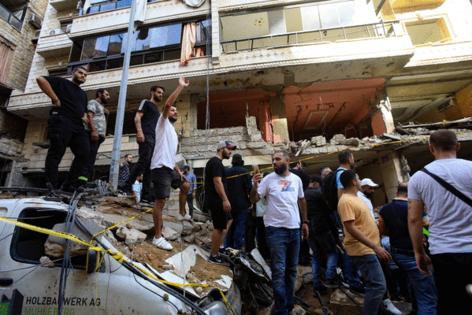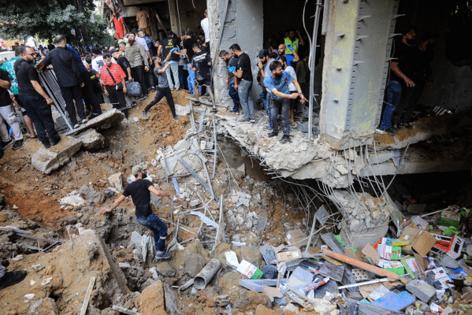Israel strikes Beirut suburb as conflict with Hezbollah in Lebanon intensifies
Published in News & Features
BEIRUT — With the danger of a wider Middle East war looming, Israel on Friday bombarded part of the Lebanese capital, killing at least 14 people and wounding 66 others, Lebanese authorities said.
The strike came just days after thousands of sabotaged electronic devices exploded across the country, killing 30 and wounding thousands, an action widely attributed to Israel.
Ahead of the Israeli strike, Hezbollah pounded northern Israel on Thursday night with rockets. The group’s leader, Hassan Nasrallah, vowed revenge for the spate of bombings through pagers and walkie-talkies.
Friday’s attack, in which Israel launched airstrikes against a crowded Beirut suburb during rush hour, targeted and killed several commanders in the Radwan Force, Hezbollah’s special forces, said Israeli army spokesman Rear Adm. Daniel Hagari.
The attack also targeted Ibrahim Aqil, whom Hagari described as a senior military commander who is close to Nasrallah. The U.S. has also accused Aqil of responsibility for the deadly bombings of U.S. Marines in Lebanon in the 1980s.
Inside the Dahieh, the southern suburbs of the capital where Hezbollah is headquartered, it was a chaotic scene. Family members rushed to the area, but were kept away by Hezbollah operatives who erected a barricade around damaged buildings.
The attack hit a seven-story residential building, close to Al-Qaim, a major mosque in the area.
For more than two hours after the strike, dozens of ambulances, bulldozers, fire trucks and even a Polaris buggy streamed in and out of the street.
“If you saw the building, you’d see why we’re all here,” said one civil defense worker who did not give his name so as to speak freely. “Three quarters of the building has collapsed.”
The Lebanese civil defense later said at least two apartment buildings had collapsed. Dahieh is a densely populated string of neighborhoods with a vibrant commercial sector, shops and markets.
Residents were told to evacuate the area. Families appeared by the barricade, looking dazed as they carried duffel bags, suitcases and pet carriers.
At one point, an older official took a megaphone, asking the crowd to disperse and let rescue crews do their job. He exhorted the crowd to show their defiance against Israel, shouting, “We are at your service, Nasrallah.”
Israel and Hezbollah renewed their clashes in October, when the Iran-backed militant group stepped up cross-border attacks in what it said was solidarity wtih Hamas and Palestinians fighting Israel in the Gaza Strip.
In recent days, Israel has repeatedly telegraphed a more aggressive stance toward Hezbollah. On Thursday, the Israeli military said its chief of staff, Lt. Gen. Herzi Halevi, had recently approved new plans for the northern conflict zone. A day earlier, Defense Minister Yoav Gallant declared that the conflict was entering a “new phase.”
The escalation comes even as U.S. officials crisscross the region imploring leaders to avoid inflaming tensions — a plea evidently ignored. Biden administration officials, who have been unsuccessful in securing a cease-fire in Gaza that could ease the regional conflict, were quick to insist the U.S. had nothing to do with Friday’s attack, a similar disclaimer made following the explosions of pagers and walkie-talkies.
“Our intensive diplomacy efforts continue,” White House national security spokesman John Kirby said Friday. “We believe, continue to believe, that a diplomatic solution is the best way forward. ... War is not inevitable.”
_____
(Bulos reported from Beirut and Wilkinson from Washington. Times staff writer Laura King in Tel Aviv contributed to this report.)
______
©2024 Los Angeles Times. Visit at latimes.com. Distributed by Tribune Content Agency, LLC.










Comments